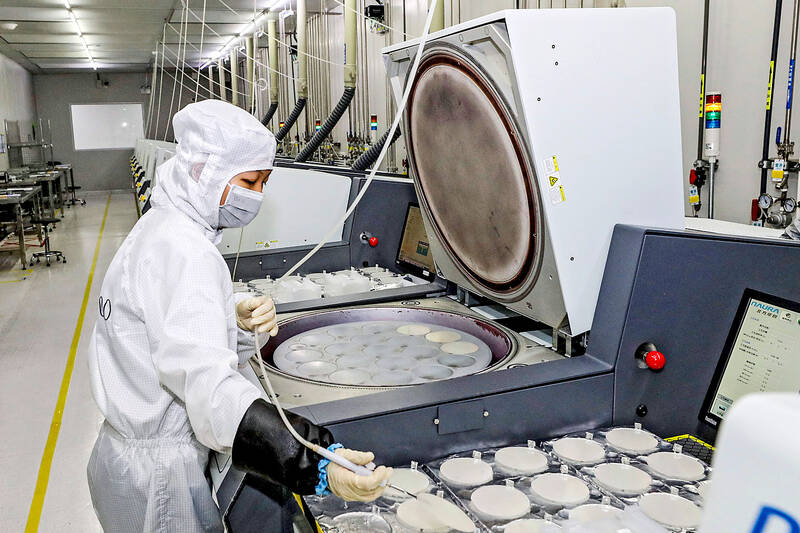China has claimed a breakthrough in developing homegrown chipmaking equipment, an important step in overcoming US sanctions designed to thwart Beijing’s semiconductor goals.
State-linked organizations are advised to use a new laser-based immersion lithography machine with a resolution of 65 nanometers or better, the Chinese Ministry of Industry and Information Technology (MIIT) said in an announcement this month.
Although the note does not specify the supplier, the spec marks a significant step up from the previous most advanced indigenous equipment — developed by Shanghai Micro Electronics Equipment Group Co (SMEE, 上海微電子) — which stood at about 90 nanometers.

Photo: AFP
MIIT’s claimed advances last week suggest that homegrown Chinese companies are beginning to make headway in developing more sophisticated machines, although SMEE and its peers have a long way to go to catch the likes of ASML Holding NV.
The resolution of the gear determines the scale at which integrated circuits can be imprinted onto silicon, and ASML’s best lithography machines now have a resolution of about 8 nanometers.
One approach to improve the density of transistors is etching lower-resolution patterns multiple times, as used by Huawei Technologies Co (華為), which helps narrow the gap.
Still, the US-led trade campaign to limit China’s access to advanced chipmaking equipment has stifled its competitiveness in developing nascent technologies such as artificial intelligence, which require the most advanced semiconductors.
In its note, the MIIT also named a slew of additional home-developed chip-related gear it wanted to see put into wider use, including oxidation furnaces and dry-etching gear.
SMEE has developed a lithography machine that can be used to make 28-nanometer chips, key state backer Zhangjiang Group (張江集團) declared last year.
However, it is unclear whether that machine has gone into production and how it relates to last week’s notice from the MIIT.
While it is widely believed that China would struggle to move far beyond its current level of sophistication — as exemplified by Huawei’s 7-nanometer Kirin mobile chip introduced a year ago — the lack of transparency has elicited concern in Washington about the effectiveness of its sweeping export controls on China and pressing the Netherlands for tighter restrictions on ASML’s China business.
China relies on ASML’s immersion deep ultraviolet lithography systems to advance its chipmaking technology, as the country has not yet been able to develop similarly capable equipment, but under US pressure, ASML is now barred from shipping to China.

GEOPOLITICAL ISSUES? The economics ministry said that political factors should not affect supply chains linking global satellite firms and Taiwanese manufacturers Elon Musk’s Space Exploration Technologies Corp (SpaceX) asked Taiwanese suppliers to transfer manufacturing out of Taiwan, leading to some relocating portions of their supply chain, according to sources employed by and close to the equipment makers and corporate documents. A source at a company that is one of the numerous subcontractors that provide components for SpaceX’s Starlink satellite Internet products said that SpaceX asked their manufacturers to produce outside of Taiwan because of geopolitical risks, pushing at least one to move production to Vietnam. A second source who collaborates with Taiwanese satellite component makers in the nation said that suppliers were directly

Top Taiwanese officials yesterday moved to ease concern about the potential fallout of Donald Trump’s return to the White House, making a case that the technology restrictions promised by the former US president against China would outweigh the risks to the island. The prospect of Trump’s victory in this week’s election is a worry for Taipei given the Republican nominee in the past cast doubt over the US commitment to defend it from Beijing. But other policies championed by Trump toward China hold some appeal for Taiwan. National Development Council Minister Paul Liu (劉鏡清) described the proposed technology curbs as potentially having

EXPORT CONTROLS: US lawmakers have grown more concerned that the US Department of Commerce might not be aggressively enforcing its chip restrictions The US on Friday said it imposed a US$500,000 penalty on New York-based GlobalFoundries Inc, the world’s third-largest contract chipmaker, for shipping chips without authorization to an affiliate of blacklisted Chinese chipmaker Semiconductor Manufacturing International Corp (SMIC, 中芯). The US Department of Commerce in a statement said GlobalFoundries sent 74 shipments worth US$17.1 million to SJ Semiconductor Corp (盛合晶微半導體), an affiliate of SMIC, without seeking a license. Both SMIC and SJ Semiconductor were added to the department’s trade restriction Entity List in 2020 over SMIC’s alleged ties to the Chinese military-industrial complex. SMIC has denied wrongdoing. Exports to firms on the list

SPECULATION: The central bank cut the loan-to-value ratio for mortgages on second homes by 10 percent and denied grace periods to prevent a real-estate bubble The central bank’s board members in September agreed to tighten lending terms to induce a soft landing in the housing market, although some raised doubts that they would achieve the intended effect, the meeting’s minutes released yesterday showed. The central bank on Sept. 18 introduced harsher loan restrictions for mortgages across Taiwan in the hope of curbing housing speculation and hoarding that could create a bubble and threaten the financial system’s stability. Toward the aim, it cut the loan-to-value ratio by 10 percent for second and subsequent home mortgages and denied grace periods for first mortgages if applicants already owned other residential